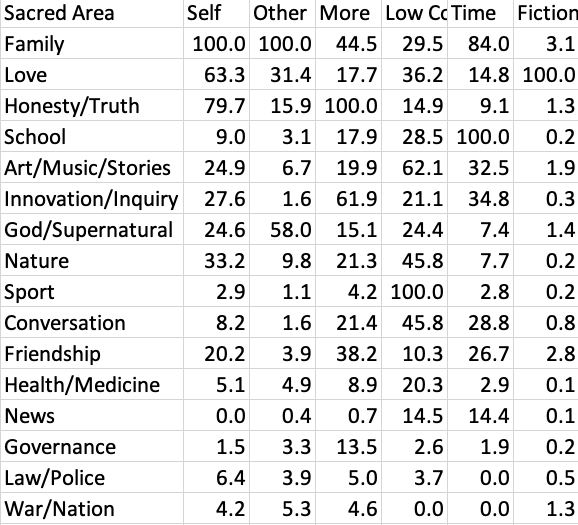More Data On The Sacred
To learn more about the sacred, I tried a few more Twitter polls. And one interesting meta datum I learned here is that few are curious about the sacred; when I asked for suggestions for more questions to ask, I got only one suggestion. Seems most are embarrassed by the sacred, and would rather pretend it doesn’t exist.
I asked about 16 sacred areas, somewhat different from my prior poll. These didn’t include politics, liberty, work, humor, or math. Re these 16 areas, I asked which you see as most sacred, which others in the world so see, what you’d like us to revere more, which has low conflicts with other sacred things, which have taken up most of your time, and which you see most emphasized in fiction.
Here are best fit priorities for these areas (max set to 100 for each area):

There are strong correlations between Self and Others (0.74), More (0.68), Time (0.34) and Fiction (0.36). Others only correlates with Time (0.38). All other correlations are <0.21.
These results suggest to me that there still remains much complexity in the sacred to understand. For example: As my followers see their priorities as different from others, what do those others say? Why are health/medicine, governance, war/nation, and law/police rated so low, when they seem to be treated so sacredly? Why aren’t other themes besides love given more emphasis in fiction? Why doesn’t a degree of conflict with other sacred things influence how sacred something seems? And as honesty/truth is top rated for wanting more of it, why don’t we have special rituals and holidays for it, as we do for other top sacred things? A similar question can be asked re innovation/inquiry.


In Christian times, Truth would have been a sub-category under God. That may explain why there aren’t separate holidays for it.
You may need to publicly accuse them of not being interested in normative inquiry (many philosophers aren't). Then they will be forced to do it out of shame.